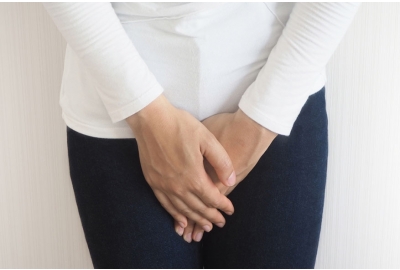
6 Vulvar Changes in Menopause

Menopause is a brand-new journey for everyone, and that means most women aren’t quite sure what changes to expect. Of course, there’s the typical — hot flashes, weight gain, fatigue. But what about the not-so-obvious? This new phase of life brings a few changes that can hit below the belt (quite literally).
Luckily, there are many unique treatment options available to offer menopause relief. The first step, though, is figuring out what to expect. Read on to learn some common vulvar changes that women go through during menopause.
Shop All Menopause Relief Products Here
Dryness and Pain During Sex
It’s not all in your head. The discomfort during intercourse is very real, and dryness is often to blame. Estrogen, the hormone responsible for keeping your vaginal walls lubricated, tends to drop with age, which can lead to dryness and a higher risk of tearing or bleeding during sex. The decreased vaginal lubrication can lead to pain during intimacy.
“Painful intercourse has long been considered a natural byproduct of menopause,” says Doctor of Physical Therapy Heather Jeffcoat, owner of Fusion Wellness. “This is such a shame, as sex doesn’t have to stop or become painful just because you hit menopause.” Choosing the right vaginal moisturizer is vital to managing discomfort.
Know that vaginal dryness during sex is common at this stage, but any heavy bleeding should be seen by a medical professional.
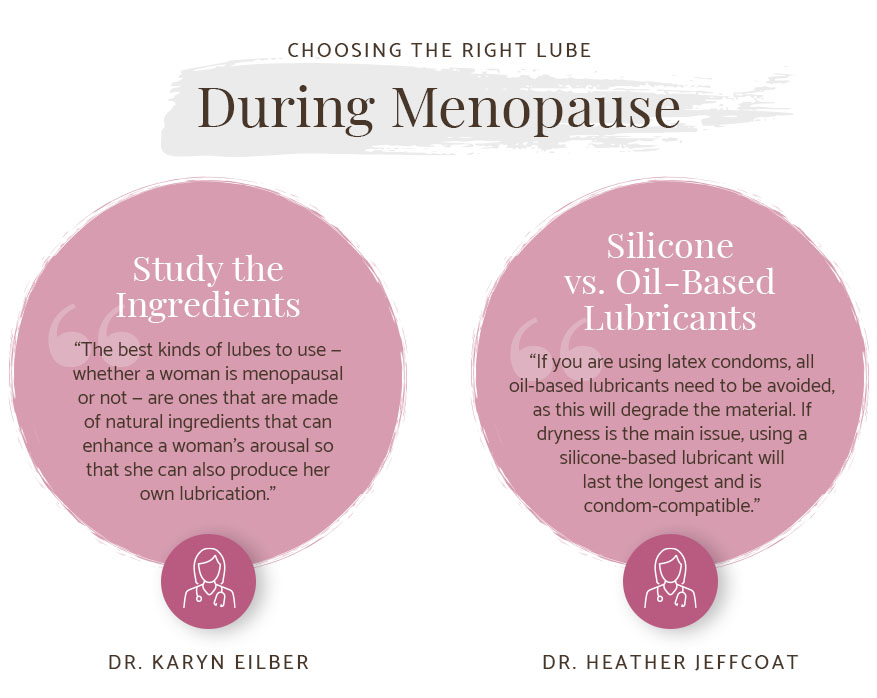
Choosing the Right Lube During MenopauseStudy the Ingredients “The best kinds of lubes to use — whether a woman is menopausal or not — are ones that are made of natural ingredients that can enhance a woman's arousal so that she can also produce her own lubrication.” — Dr. Karyn Eilber Silicone vs. Oil-Based Lubricants “If you are using latex condoms, all oil-based lubricants need to be avoided, as this will degrade the material. If dryness is the main issue, using a silicone-based lubricant will last the longest and is condom-compatible.” — Dr. Heather Jeffcoat |
Changing Odors
If you’ve already reached menopause, you know that there’s a correlation between menopause and body odor. These changes can also affect the vagina.
“Changing odor is related to changes in the normal vaginal microbiome that is influenced by hormonal changes,” says Dr. Karyn Eilber, CEO and Co-Founder of GLISSANT and Associate Professor of Urology and Obstetrics and Gynecology at Cedars-Sinai Medical Center. “Estrogen helps keep the vagina acidic, which is what maintains the normal balance. Vaginal estrogen or medications such as boric acid can help.”
Menopause and Body Odor: 4 Things to Keep in Mind
Increased Risk of Infections
Studies show that the low levels of estrogen make menopausal women more prone to urinary tract infections (UTIs). According to the Journal of Clinical Gerontology and Geriatrics, lower estrogen levels cause the urinary tract to lose volume. This can result in more frequent urination and UTIs.
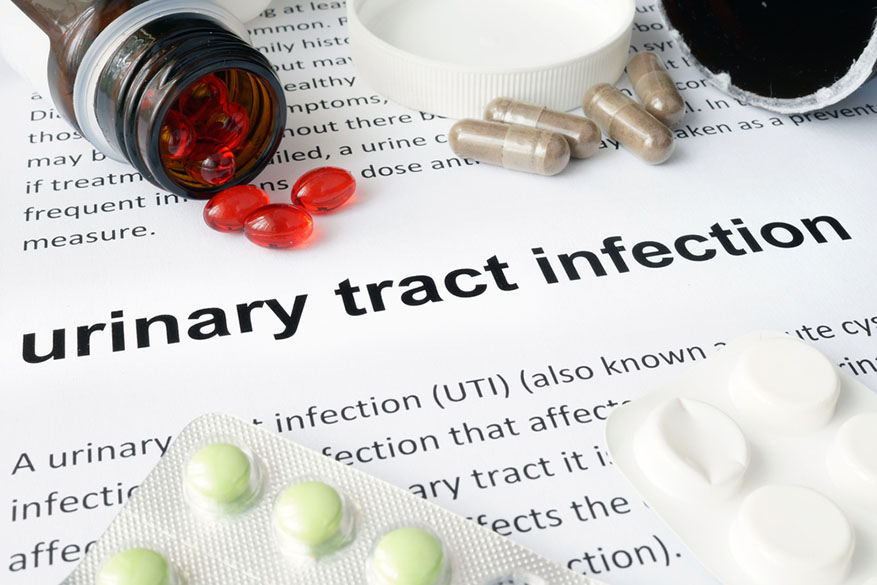
“Many women report increased UTIs during menopause,” says Dr. Eilber. So what’s the best way to treat it? “Some women can just start a cranberry supplement, while others need to use vaginal estrogen or boric acid. In some cases, a preventative antibiotic is taken at the time of sexual activity.”
In addition to UTIs, women going through menopause are more susceptible to vaginal thrush. This condition is an infection caused by an overgrowth of yeast. This infection — also known as vulvovaginal candidiasis — causes a white, thick, and odorless discharge similar to the texture of cottage cheese.
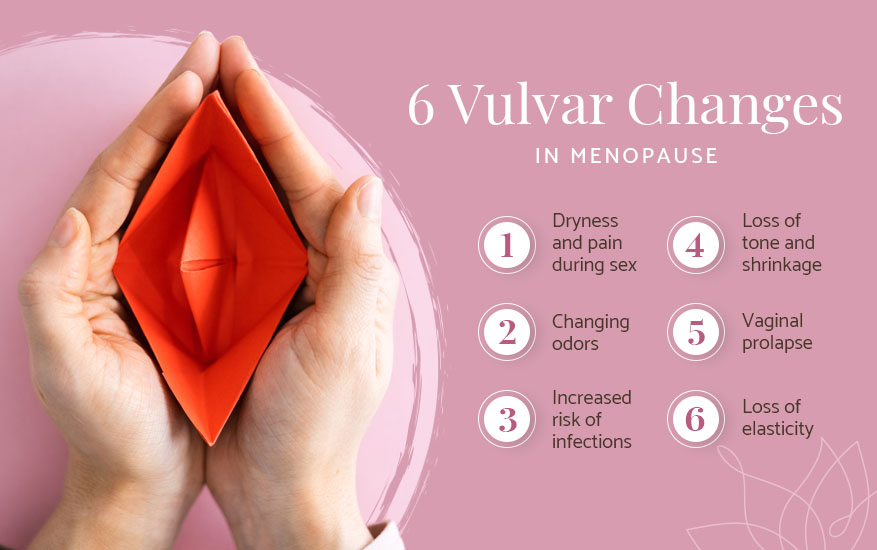
Loss of Tone and Shrinkage
We sometimes forget that the vagina is a muscle. Like any other muscle, it can lose its tone and shrink if it's not used as frequently. “The most common visual change is labial resorption (where the labia become less well-defined and smaller),” says Dr. Jeffcoat. Decreasing testosterone may also cause the clitoris to become smaller.
Vaginal Prolapse
When the vagina expands or stretches into other organs, this is known as vaginal prolapse. Women experiencing prolapse may feel a fullness in the vagina, almost like a heavy pulling sensation. They may also experience a sudden loss of bladder control and a pain in the lower back when lying down.
Loss of Elasticity
“A lack of estrogen is the main culprit related to dryness and tissue thinning, also referred to as Genitourinary Syndrome of Menopause (GSM),” says Dr. Jeffcoat. “If your doctor clears it, using a local estrogen can help quite a bit at reducing symptoms of dryness, burning, and pain.”
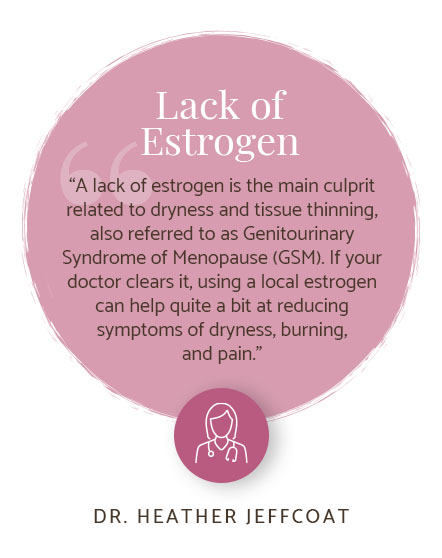
Thankfully, there are ways to alleviate any pain or discomfort with these new changes. Regular sexual activity, with or without a partner, may prevent GSM. This is because sexual activity can increase blood flow to your vagina, keeping your vaginal tissues healthy.
Managing Menopause Symptoms with Sofia & Grace
There is no getting around it — menopause can bring a whole host of new physical symptoms to the table. But that doesn’t mean you have to manage them alone. Sofia & Grace understands what you’re going through and we’re here to help. Shop our collection of menopause relief products today or connect with our community of women on Facebook to talk about all things menopause, incontinence, and more.
Image Credits
jaojormami/Shutterstock.com
Vitalii Vodolazskyi/Shutterstock.com
Andrey_Popov/Shutterstock.com
M-vector/Shutterstock.com